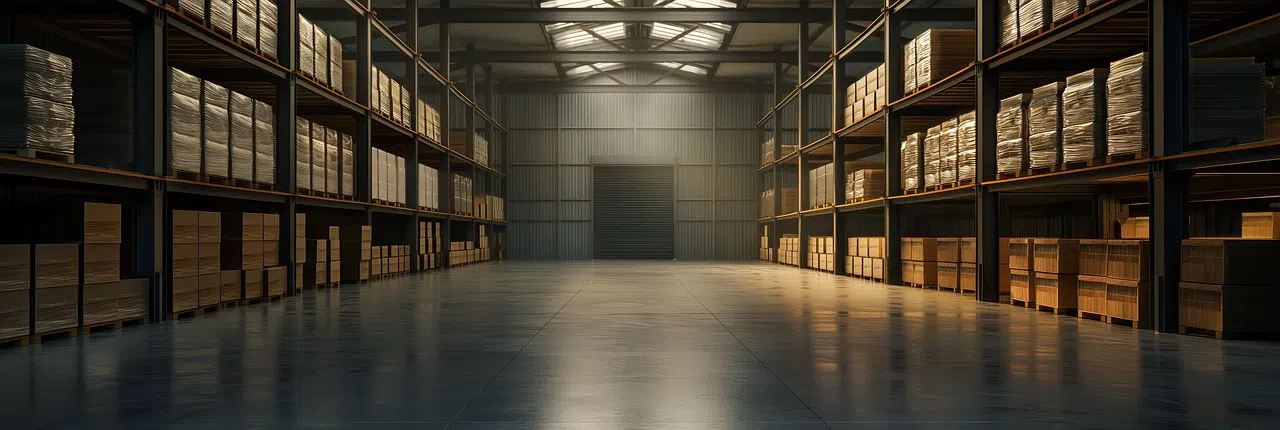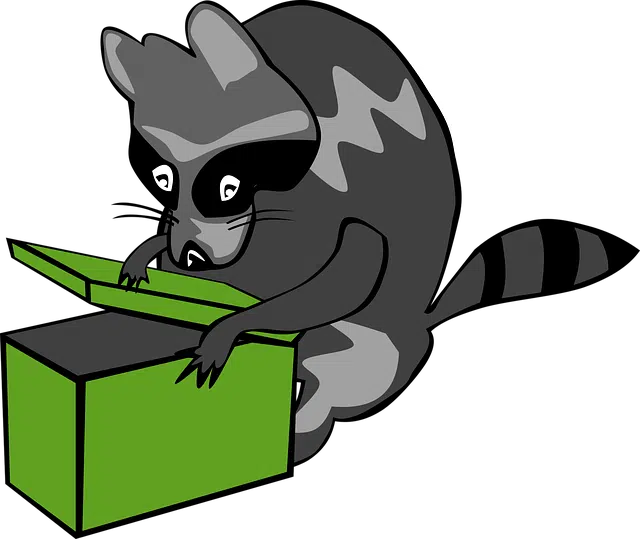Raccoons are opportunistic nocturnal feeders that prefer low-effort and widely available food sources. That's why we see such a widespread increase in urban raccoon population, particularly during the winter months.

Commercial food storage areas are at a higher risk of raccoon infestations because of the availability and easy access to large quantities of food. While raccoons pose a number of issues in any urban setting, the consequences at food storage facilities are greatly multiplied. Such consequences include product contamination, health hazards, property damage, and legal liabilities.
Once a raccoon infestation is suspected or confirmed, it is vital to call in a professional, licensed commercial raccoon removal service for immediate and permanent results.
FAQs: Raccoons in Food Storage Areas
Q: Will the Canadian Food Inspection Agency (CFIA) fine us if they find raccoon droppings?
A: Indeed, raccoon droppings are a serious sanitation issue, evidence of failure in a company's pest control measures and subject to fines and other penalties. Here's what the Government of Canada states on this issue: "When businesses fail to comply with their obligations under the Safe Food for Canadians Act and the Safe Food for Canadians Regulations with respect to ensuring the safety of food, the CFIA has several enforcement tools at its disposal such as monetary penalties and suspending or cancellation of licences."
Q: Does the presence of a raccoon mean we have to stop operations?
A: Not necessarily, but a full shut down is a possibility. Immediate action is required. Contact a professional wildlife removal service at once. Depending on the area of infestation and product damage, you may need to shut down part of your operations or will have to put in place expanded quality control measures.
Q: Can raccoons nest inside pallets or storage containers?
A: Yes, raccoons can turn any dark and quiet crevasse into a den. Areas with little human traffic are most at risk.
Q: How can raccoons affect refrigerated or frozen stock?
A: Raccoons are notorious for chewing wires. Your refrigeration units may be at risk of malfunction or even become a fire hazard.
Q: What material should we use to seal entry points to prevent chewing?
A: Heavy-duty hardware cloth or other wire mesh should be used in addition to (over or under) the original building materials. Always contact a professional contractor for repairs.
Q: Are there early warning signs unique to commercial facilities compared to residential properties?
A: The warning signs of raccoon presence are universal. They include scratching or thumping noises, foul and musky odours, feces, and raccoon tracks (paw prints).
Q: Can raccoons access multiple floors or storage zones in a large facility?
A: Raccoons can absolutely gain access to an entire building in no time at all. They are avid climbers and surprisingly nimble, given their size.
Q: We use bulk raw materials (grains, feed). Are raccoons attracted to clean, sealed bags?
A: It isn't the bags that attract raccoons... it's their content. Raccoons have an extremely well-developed sense of smell and grains are a welcome addition to their diet.
Q: What safety precautions should staff take if raccoons are discovered?
A: If raccoon feces has been discovered, do not touch! Call a professional raccoon control company such as Hawkeye Bird & Animal Control to remove the animals and latrine(s). Until their arrival, it is advisable to use PPE including masks and gloves.
Q: Are baby raccoons common in commercial storage areas?
A: Yes, commercial storage areas offer ample space and often privacy to new or expectant mothers. You may hear distinct cooing or crying sounds, especially at nighttime.
How often should commercial facilities inspect for raccoon activity?
A: Commercial facilities should be inspected on a monthly basis. Staff should also be encouraged to report any signs or unusual noises as soon as they notice them.
Q: How much does permanent raccoon removal cost for commercial properties in the GTA?
A: Rates for permanent raccoon removal in commercial settings will vary and depend on the number of traps and number of visits by a technician needed. Services start at $225.
Q: What long-term monitoring is recommended after professional removal?
A: After raccoons have been removed from the area and all repairs have been completed, it is important to reduce any spillage or waste so as not to attract other animals. Doors should be kept closed whenever possible and monthly inspections should follow.
 Why Raccoons Target Commercial Food Storage Areas
Why Raccoons Target Commercial Food Storage Areas
- Constant availability of high-calorie food.
- Easy entry points: delivery doors, loading docks, vents, or structural gaps.
- Warmth from storage rooms, refrigeration units, or mechanical areas.
- Presence of garbage, spilled products, or poorly sealed storage bins.
Signs of Raccoon Infestation in Food Storage Facilities
- Torn packaging, gnawed containers, or spilled food.
- Nocturnal noises (scratching, thumping, or chirping from baby raccoons).
- Paw prints or droppings near storage shelves, pallets, or floors.
- Damaged insulation, wiring, or ductwork inside storage areas.
- Foul odour from urine or feces.
How Raccoons Access Food Storage Areas
Unfortunately, any warehouse-type facility will have many access points and there's virtually no way of blocking them all. Here a few examples:
- Loading Dock Gaps
Raccoons chew through or exploit damaged weather seals and brush sweeps on roll-up doors, which are frequently left open for loading/unloading. - Roof and Vents
Raccoons breach damaged screening on intake/exhaust vents located near the ground or on the rooftop, leading into utility rooms or drop-ceiling cavities (common in commercial kitchens). - Utility Penetrations
Crafty raccoons can enlarge unsealed holes where pipes, electrical conduits, or refrigeration lines pass through walls or the foundation.
Risks of Raccoons in Commercial Food Storage
- Mandatory Regulatory Failure (The Stop Work Order)
The presence of raccoon feces, urine, or nesting material is an immediate violation of federal and provincial food safety standards (e.g., HACCP, CFIA, local health departments). This leads to fines, temporary closure, or forced disposal of entire product lots. - Biohazard Risk (Raccoon Roundworm)
Feces of animals carrying raccoon roundworm (Baylisascaris procyonis) contaminate surfaces, air, and packaging. Cleanup near food requires strict hazmat protocols that general pest control companies cannot perform. - Product Contamination and Loss
In their search for food, raccoons tear through soft packaging (e.g.,flour bags, cereal boxes, and rice sacks) and cause direct contamination. Businesses like restaurants or grocery stores cannot simply move their product, so in most cases have to dispose of of all of it and experience massive inventory losses.
Raccoon Prevention and Immediate Response
Prevention (Protecting Inventory)
- Secure Perimeter Doors
Reinforce all loading dock seals and secure delivery doors with heavy-gauge steel mesh where feasible. - Secure Vents and Ventilation Units
Cap vents and air intakes wherever possible. - Internal Quarantine
Store all bulk goods and raw materials off the floor and away from perimeter walls to facilitate inspection. - Waste Management
Use robust, lockable metal bins for all food waste, and strictly enforce cleaning around garbage chute access and compactors.
Response (After Sighting):
- Call Professionals
Licensed raccoon removal ensures the safety of staff and product integrity. - Quarantine Zone:
Immediately isolate and log all inventory in the affected zone. - No DIY
Using repellents is ineffective in a high-reward environment, and compounds the liability risk.
Seasonal Considerations to Keep Raccoons Away
- Winter (Late Fall to March)
It's good practice to inspect rooftop HVAC units, vents, and any utility rooms that generate heat, as raccoons are desperate to find a warm den to survive the cold. Install caps where possible. - Spring/Summer (April to August)
Expectant mothers will seek out structural weak points to create a nursery. Ensure all water sources (e.g., leaky pipes, puddles near drains) are eliminated. - Fall (September to November)
In preparation for winter, raccoons forage aggressively to build fat reserves. This is the last window to seal all structural vulnerabilities (such as vents and cracks) before the animals choose a permanent winter den.
Food Storage Property-Type Specific Guidance
- Raccoons in Restaurants & Commercial Kitchens
- Securing waste disposal, dumpster areas, and outdoor storage is of utmost importance.
- Minimize overnight exposure of food and ingredients.
- Install locks on cupboards and storage areas where possible.
- Raccoons in Warehouses & Distribution Centers
- Inspect pallets, packaging, and ventilation units regularly.
- Ensure foundation gaps, vents, and HVAC units are secure.
- Instruct staff to report unusual noises or sightings immediately.
- Raccoons in Grocery Stores & Retail Food Outlets
- Prevent access via loading docks and delivery entrances where possible.
- Implement strict sanitation and waste management protocols.
- Regularly inspect packaging of food in storage area and on shelves.
Permanent Solution for Food Safety Compliance
- The Flaw of Relocation
The mandatory relocation (1 km rule in Canada) is futile in a food facility because the raccoon will return to the reliable food source, making future contamination nearly inevitable. - The Hawkeye Guarantee
Hawkeye Bird & Animal Control is the ONLY wildlife service in the GTA that can offer permanent raccoon removal and a GUARANTEE that the animal(s) will not return. - Permanent Removal
It guarantees that the raccoon will not return, providing the only definitive solution that allows the facility to certify long-term sanitation compliance without recurring risk. - Post-Removal Sanitation Mandate
Raccoon removal must be followed by detailed biohazard decontamination performed by certified technicians to clear feces, urine, nesting materials, and potential pathogens, ensuring the storage area is returned to food-safe standards.
Hawkeye's Permanent Raccoon Removal for Commercial Food Storage Areas
Warehouse and other commercial food storage areas are at high-risk for raccoon infestation, especially during the fall and winter months. Early detection and practicing proper raccoon control for warehouses and other food storage areas, including professional removal and permanent exclusion, are key to protecting food, staff, and business reputation
Hawkeye offers the only licensed, permanent raccoon removal in the GTA—legal, humane, safe, and guaranteed. Contact us today for commercial raccoon removal.
Hawkeye's raccoon removal services are available all across Southern Ontario, including Toronto, Scarborough, Brampton, Vaughan, Markham, Ajax, Pickering, Newmarket, Etobicoke, Oshawa, and Mississauga.
Related Articles:
https://www.hawkeye.ca/raccoon-control-trapping-and-removal
https://www.hawkeye.ca/toronto-raccoon-removal-control
https://www.hawkeye.ca/blog/how-to-permanently-remove-raccoons-in-vaughan
https://www.hawkeye.ca/blog/how-to-get-rid-of-raccoons
https://www.hawkeye.ca/blog/permanent-raccoon-removal-for-gta-hotels-and-resorts














